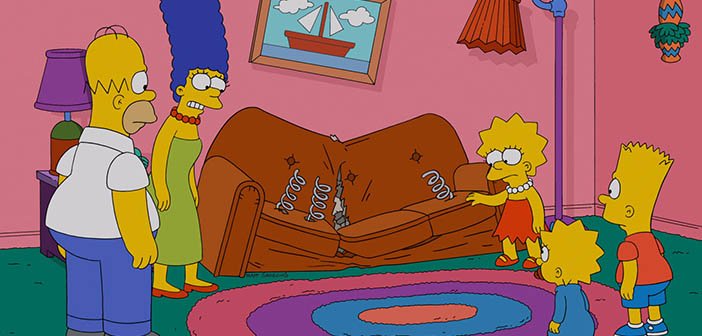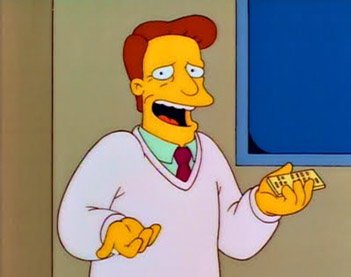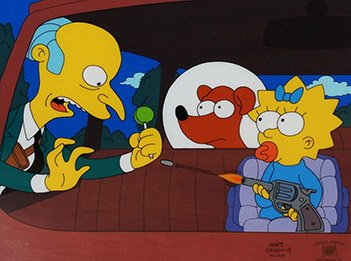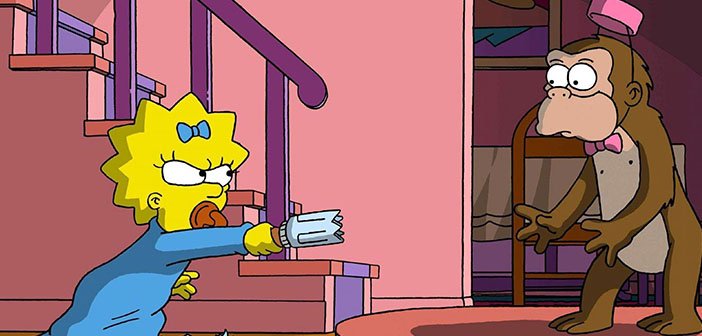The Most Memorable Simpsons Tropes
In 1989, The Simpsons came on our television sets, took everything we thought we knew about animation, and kicked it in the crotch.
This was no mindless Saturday-morning pap, no standard superhero reiteration. Instead, it was sharp satire, disaster and dysfunction, and—above all—a big bowl of comedy spiked with cultural references.
There are many things that make The Simpsons great. But much of what makes it unique is its fearless adoption and long parenthood of an unruly brood of tropes. No fewer than 37 tropes were actually named for The Simpsons, ranging from Kent Brockman News (parodied news reporting from an incompetent or biased anchor) to Flanderization (the exaggeration of a character’s minor personality trait over time until, eventually, it defines them), and, of course, Think of the Children! (no explanation necessary).
In its 25-year history (and counting), The Simpsons has played with hundreds—if not thousands—of tropes, including widespread plot devices that border on the cliché (The Chosen One; All Girls Want Bad Boys), subtler tropes that blend smoothly into the Springfieldian background (Ugly Guy, Hot Wife; Middle Child Syndrome), and everything in between. Many have functioned merely as small tools in the vast architecture that is America’s longest-running sitcom (and longest-running animated program), while others have changed the continuity-shy series forever. All have pushed button after button on The Simpsons’s legendary joke machine.
Here are ten of the most memorable Simpsons tropes:
Couch Gag

The Simpsons, of course, gave the Couch Gag trope its name. A Couch Gag is an interchangeable segment during the opening or closing credits of a show offering new content every episode—in this case, the Simpson family’s trip to the couch just before the theme song ends. In longer versions of the title sequence, we are treated to two additional Couch Gags: Bart’s chalkboard message in detention and Lisa’s saxophone solo. Over time, even more Couch Gags have been added (particularly after the HD transition in 2009). The end credits also feature the occasional Couch Gag—most notably pee-wee football coach Homer “cutting” many of the people appearing in the credits from his team in “Bart Star” (Season 9, Episode 6).
Where the Hell is Springfield?
This is another trope named for The Simpsons, in which the setting (usually the city and/or state) of a fictional work is shrouded in mystery for comedic or dramatic purposes. Where the Hell is Springfield? is a trope adopted with obvious foresight on the part of Simpsons creator Matt Groening, allowing for improbable geographical diversity within driving distance of the family’s small hometown. For any plotline or joke that requires new surroundings, everything from beaches and mountains to deserts and swampland is conveniently accessible. Many U.S. states are home to at least one “Springfield,” further clouding the conundrum.
Springfield’s indeterminable location has long been a recurring gag of the series. In “Sunday, Cruddy Sunday” (S10, E12), Marge never quite finishes reciting her address: “742 Evergreen Terrace, Springfield, Oh-hiya Maude, come on in!” In “Lisa Gets an A” (S10, E7), Superintendent Chalmers cites Springfield Elementary as the most dilapidated school in Missouri … only to explain, when Principal Skinner and Lisa give him an odd look, that this was the reason the school was “shut down and moved here, brick by brick.”
You Might Remember Me From …

Has-been B-movie actor Troy McClure’s catch phrase You Might Remember Me From … introduced much of the show’s best word play. The trope refers to a once-popular actor’s resurgence in a new project. A series of setbacks followed Troy McClure’s professional success in the ‘70s, possibly due to rumors of his fish fetish. To keep his career alive, he appears in (seemingly) every small project that comes his way.
For the record, you might remember Troy McClure from such films as Dial M for Murderousness and The Greatest Story Ever Hula-ed; such educational and self-help videos as Alice Doesn’t Live Anymore and Locker Room Towel Fights: The Blinding of Larry Driscoll; and such automated information kiosks as Welcome to Springfield Airport and Where’s Nordstrom? Oh, and let’s not forget his starring role as “The Human” in the musical Stop the Planet of the Apes, I Want to Get Off! It’s the part he was born to play.
What Could Possibly Go Wrong?
This popular trope is an invitation to disaster. What Could Possibly Go Wrong? is a sentiment shared—and even, sometimes, a line uttered—by characters who are minutes away from meeting their doom. Anyone who’s seen Titanic would know better.
When the Simpsons travel to Jurassic Park Itchy & Scratchy Land (S6, E4), their helicopter pilot welcomes them to the amusement park “where nothing can possib-lie go wrong. … Uh, possibly go wrong. Heh. That’s the first thing that’s ever gone wrong.” Sure enough, the violence-themed park turns … violent when the Itchy & Scratchy robots malfunction and begin to attack visitors instead of each other. Robot War would also be an appropriate trope to describe this fan-favorite episode.
Chekhov’s Gun

Short story expert Anton Chekhov believed in tossing out everything but the essential in a story, famously writing, “If you say in the first chapter that there is a rifle hanging on the wall, in the second or third chapter it absolutely must go off. If it’s not going to be fired, it shouldn’t be hanging there.” There are plenty of Chekhov’s Guns throughout The Simpsons, notably an actual gun in “Who Shot Mr. Burns, Part 1” (S6, E25). Mr. Burns’s own gun—the one that eventually shoots him—is seen near the end of the episode, while the mystery carries into the next season. In “The Blunder Years” (S13, E5), Burly paper towels come unexpectedly to the rescue in draining a local quarry.
The best use of Chekhov’s Gun is perhaps in “Cape Feare” (S5, E2). Sideshow Bob follows the Simpson Thompson family to their new boathouse on Terror Lake while they listen to the works of Gilbert and Sullivan. Doomed, however, to trip over his own ego, Sideshow Bob grants one last request to a cornered and desperate Bart: a performance of Gilbert and Sullivan’s operetta H.M.S. Pinafore. This stall tactic ends in Sideshow Bob’s arrest just after the final number, “Oh joy, oh rapture unforeseen.”
“The Reason You Suck” Speech
“The Reason You Suck” Speech is fairly self-explanatory as tropes go. It’s a speech delivered from one character to another (usually a combination of the villain and hero, or between villains or heroes) that attacks aspects of the listener’s person, methods, or morals. It may be cathartic or accusatory, but it’s usually spot-on. And it tends to be satisfying for the audience, especially if the response is a “Reason You Suck” Speech in the opposite direction.
Many Springfielders are prone to tirades, but the standouts both target Homer. Frank Grimes, known as “Homer’s Enemy” (S8, E23), is the only person to see Homer for what he really is: a lazy, incompetent, inconsiderate oaf. His “Reason You Suck” speech calls out Homer’s effortless success despite his many flaws: “You’re what’s wrong with America, Simpson. You coast through life, you do as little as possible, and you leech off of decent, hardworking people like me.” The dressing down to end them all, though, comes from Flanders after his house (and life) collapses in “Hurricane Neddy” (S8, E8). His victims include Marge, Bart, Lisa, Chief Wiggum, Krusty the Clown, Lenny, and Moe. The grand finale: “Homer … you are the worst human being I have ever met.”
Little Miss Badass

Springfield’s biggest badass is also its tiniest member: Maggie Simpson. As Little Miss Badass of the show, Maggie is much more than meets the eye, fooling the adults around her (including her own parents) with feigned innocence and a quiet personality. There’s also the fact that she’s an infant and, naturally, easy to underestimate.
It’s Maggie who shoots Mr. Burns (S6, E25/S7, E1), saves Homer from drowning (S11, E6), and takes out the Mafia, sniper-style, when they threaten her family (S13, E22). But little Miss Simpson’s moment of glory is The Great Pacifier Rescue of Season 4 (E2) during her stint at the Ayn Rand School for Tots. A trip through the air ducts, a bungee dive for the keys, a suction dart gun, and a glide across the room from a Krusty the Clown hanger end in victory of the badass-est variety.
New Job as the Plot Demands
This trope isn’t named for The Simpsons, but it might as well be. A handful of main characters (Marge, Barney, Moe) and a long list of minor characters (Gil, Lindsey Naegle, the Squeaky Voiced Teen), take up a New Job as the Plot Demands in frequent and typical Simpsons fashion—i.e., practicalities be damned.
Homer could carry this trope entirely on his own (and then, probably, turn “Trope Transport” into a new career). In “Poppa’s Got a Brand New Badge” (S13, E22), Homer lists dozens of jobs he’s pursued over the years: boxer, mascot, baby proofer, imitation Krusty, truck driver, plow driver, food critic, conceptual artist, grease salesman, carny, mayor, grifter, body guard for the mayor, garbage commissioner, mountain climber, farmer, inventor, Smithers, Poochie, celebrity assistant, power plant worker, fortune cookie writer, beer baron, missionary, and more. In that very episode, he starts his own security company and winds up police chief.
Most notably—and, perhaps, least realistically—Homer trains as an astronaut in “Deep Space Homer” (S5, E15) and goes on a mission aboard NASA’s Corvair space shuttle.
Cue the Flying Pigs
Have we just heard from a skeptical character that something will occur when Hell freezes over—or when pigs fly? Well, Cue the Flying Pigs.
Leave it to The Simpsons to contrive a flying pig scene that—contextually, at least—makes perfect sense. In “Lisa the Vegetarian” (S7, E5), Homer hosts a backyard barbecue starring a roast pig in the role of Masterpiece. Lisa, a new but convicted vegetarian, hauls the grill away (roast pig in tow) from the back of a riding lawnmower, sending Homer’s pièce de résistance through bushes, across traffic, downriver, and then up into the air as it bursts through a hole in the hydroelectric dam. At that very moment, Mr. Burns jokes to Smithers that he’ll donate a million dollars to the local orphanage … when pigs fly. You know the rest.
Crowd Song

Is it time for every character to burst spontaneously into song? Do they all know the words, the melody, and the choreography without ever rehearsing? Hallelujah. You’ve got yourself a Crowd Song.
The Simpsons is famous for its clever, catchy Crowd Songs, many of which parody pop music or classic musicals. Some of the best include “Adults/Kids” (S10, E11), which pits the children of Springfield against the adults; “We Put the Spring in Springfield” (S8, E5), a defense of the local burlesque house; and “The Garbage Man” (S9, E22), featuring all of the trash pickup and cleaning services Homer promised in his campaign for sanitation commissioner.
The winner by mob vote, though, is “The Monorail Song” (S4, E12). At a town meeting, con artist Lyle Lanley convinces the residents of Springfield to build a monorail with the three million dollars Mr. Burns was fined for dumping nuclear waste in the city park. Naturally, the episode ends with a collective “D’oh!” and a lesson stubbornly unlearned.
Nothing brings a family like the Simpsons—or a town like Springfield—together quite like a Crowd Song. But no matter which tropes the show goes on to embrace (and it seems destined to accommodate them all), we can count on sneaky comedy, clever cultural commentary, and infinitely memorable moments.
Featured Image Credit: Comicbook.com

